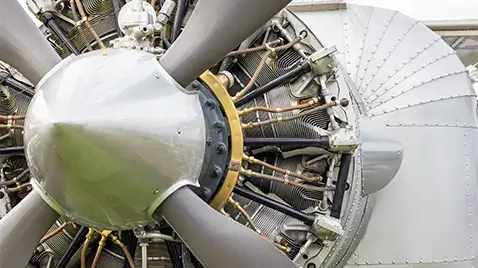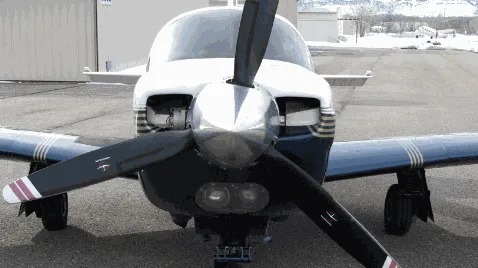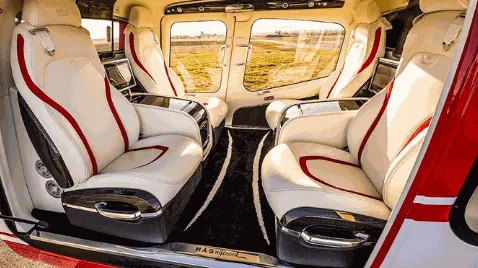Catalog of Aircraft Fastener Parts
The definition of a fastener is any piece of hardware that closes or secures other parts together, typically, without creating a permanent connection. A variety of items technically fall under this definition, like ropes and hinges, but they are not called fasteners due to their wider variety of uses. Fasteners are specific items that rigidly connect two objects.
Fasteners are typically made out of steel (stainless, carbon, and alloy), titanium, or aluminum. Fasteners often have coatings applied to them to prevent corrosion and increase the lifespan of the parts. Typical coatings are nickel, silver, chromium, zinc, phosphate, black oxidizing, and cadmium.
At Cogent Sourcing, we supply aviation fasteners manufactured by companies like HI Shear, Bell Helicopter, Southco Inc, Boeing, Arconic, Fairchild, Eaton, PCC Fasteners, and Monogram.
Traceability and Standards
Fasteners are used in almost every manufactured product, from toys to military aircraft. However, there are many types of fasteners that vary in quality and standards. High-risk and high-stress environments require higher standards for composition, material, design, and safety specifications. The automotive, marine, and aerospace industries all require higher standards for fasteners due to the nature of their operating environments
Hardware components like fasteners are commonly traded items. Because of this and their numerous applications, there are uniform standards as imposed by the American Society of Mechanical Engineers (ASME). ASME has produced several standards that clarify the definitions and types of fasteners, as well as their dimensions and what kind of materials should be used. There are also military standards that are applied to fasteners used in military or defense purposes. Military standards include requirements for traceability, an integral resource for ensuring conformity and safety.
Types
Fastener categories include: battens, bolts, buckles, cable ties, cams, clamps, clasps, clips, clutches, frogs, flanges, grommets, hook-and-eye closures, latches, nails, nuts, rivets, retaining rings, screws, staples, studs, spacers, ties, threaded fasteners, pins, pegs, washers, and zippers.
Drive types include Phillips and Frearson, combination, slotted, one way, socket, square, and star.
Washer types include flat, fender, finishing, split lock, internal tooth lock, external tooth lock, dock, square, and ogee.
Nut types include hex, heavy hex, jam, nylon insert lock, nylon insert jam lock, cap, wing, acorn, square, tee, flange, prevailing torque lock, k-lock or kep, slotted, coupling, castle, and pin lock.
Anchoring products include stud anchors, sleeve anchors, machine screw anchors, lag shields, drop-in anchors, double expansion sleeves, spring toggle wings, concrete screws, plastic toggle, conical anchors, self-drilling drywall anchors, hollow wall anchors, wood screw anchors, nail drive anchors, and anchor bolts.
Aerospace Fasteners
Fasteners used in the aerospace industry are similar in function and appearance to those used in other industries, but differ significantly in terms of quality, material, and weight. Aerospace fasteners operate in environments that bring risk of corrosion, exposure to temperature extremes, high stress and weight loads, high pressures, and chemicals. This means aerospace fasteners have to be made from specific materials and designed and manufactured to higher standards.
Aluminum: Aluminum is a popular choice for making fasteners in aircraft, but not in spacecraft. Aluminum requires extra treatment to be used in spacecraft. Aluminum must be cold formed, is not optimal if temperatures reach 350 degrees Fahrenheit, and is vulnerable to corrosion caused by stress.
Steel: The various types of steel are strong, but heavy, a consistent problem for aircraft components. Stainless steel and alloys are the most commonly used types of steel used in the aerospace industry.
CRES Series Steel: Series 300 is often used in bolts and screws. Series 300 is resistant to corrosion but vulnerable to high temperatures. Series 400 can rust but possesses higher heat resistance.
Alloy steels are vulnerable to corrosion, but more durable.There are treatments that can increase corrosion and heat resistance but can also cause steel to lose its resistance to tension corrosion.
Superalloys: Superalloys are used in aerospace because they are versatile, strong, and can withstand extreme temperatures. Superalloys include Inconel 718, H-11, Waspaloy, A286, Monel, Hastelloy, Haynes, K-Monel, MP159, and MP35N. Choosing the right superalloy depends on what stresses a fastener is expected to face.
Titanium: Titanium is as strong as steel, and lighter as well.
Automotive Fasteners
The automotive industry uses many types of fasteners, with the most common being studs, nuts and bolts. They vary by minimum tensile strength, and material minimum yield strength. They are ranked by the Society of Automotive Engineers (SAE) and their graded system.
Automotive Bolts
Also referred to as threaded fasteners, these components are used in applications where a strong, rigid attachment is needed. Bolts are headed, with a blunt end that is threaded. Compared to other types of fasteners, bolts have a longer grip length, and a shorter threaded portion for attaching a nut. Bolts often used in the automotive industry are U-Bolts, wheel bolts, and hub bolts.
Automotive Nuts
Automotive nuts are hex or square, with a threaded circle in the center. They are used to fasten and secure bolts. Their grade must match or be higher than their paired bolt. Automotive nuts are used in many applications but can be utilized in more complex functions where a collar nut, t-nut, and locking nut may be used.
Automotive Studs
Automotive studs are threaded on both ends and have an unthreaded mid-section. They are secured to other components using nut screws. Automotive studs are made from various materials including aluminum, bronze, brass, copper, plastic, or nylon. Studs are commonly used in building an automotive engine, securing the gasket head and cylinders, or situations that need higher stress tolerances than what bolts are able to provide.
SAE and Metric Standards
Automotive fasteners are graded by SAE (fractional) and metric grades. SAE grades of 2, 5, 8, and metric grades of 5.8, 8.8, 10.9, and 12.9 are used in the automotive industry.
Marine Fasteners
The greatest problem for fasteners used in the marine industry is the corrosive threat of saltwater. This, together with the higher presence of wood materials, means that galvanic corrosion and crevice corrosion are also commonly faced threats. Marine fasteners are sorted by their materials and intended use.
Stainless Steel: most marine fasteners are made from stainless steel. Stainless steel is resistant to corrosion and offers the optimal rigidity and strength for marine applications. CRES Series steel 18-8, 304, and 316 are used, with 316 offering the best corrosion resistance.
Hot Dipped Galvanized Fasteners: Stainless steel dipped in zinc, creating a bonded alloy. Fasteners that undergo the process are more resistant against corrosion and have higher tensile strength than standard stainless steel. Zinc plated steel is considered the best option for applications in a marine craft’s engine. Fasteners of this type are also used in applications with higher loads, such as the shaft coupler.
Silicon Bronze: Silicon bronze is made from copper, with silicon and corrosion-resistant alloys like zinc mixed in. Silicon bronze fasteners are used in applications that frequently come into contact with water, applications below the waterline, and wooden vessel construction. SB is highly resistant to corrosion from liquids and chemicals and operates well in the absence of oxygen. It is also less likely to galvanize other metals it is secured to.
Send Instant RFQ
Featured Parts






